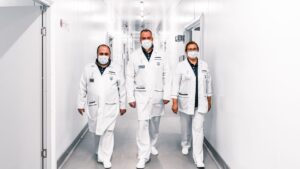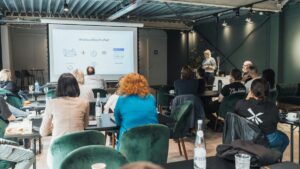At most medical schools, immunology is a lecture-heavy subject filled with T-cells, cytokines, and complex cascades. But at Touro College of Osteopathic Medicine (TouroCOM), students are learning immunology through a different lens—one that emphasizes hands-on learning, clinical application, and the osteopathic philosophy.
Welcome to the TouroCOM Immunology Workshops, where defending the body becomes more than just memorizing pathways—it becomes a real-time diagnostic skill rooted in whole-person care.
Why Immunology Is So Important for DOs?
Understanding the immune system is critical in modern medicine. From infections and inflammation to autoimmune disorders and cancer immunotherapy, immunology touches nearly every system.
For DOs, it’s more than fighting disease. It’s about supporting the body’s natural defenses and recognizing how structure, function, and environment interact to impact immune health.
That’s why TouroCOM’s workshops integrate:
- Osteopathic principles
- Real clinical cases
- Systems-based understanding
- Active engagement, not passive memorization
What Happens in a TouroCOM Immunology Workshop?
These workshops are more than a review session—they’re an interactive learning experience. Students collaborate in small groups and engage in scenarios that reflect real-world medicine.
Key Features:
- Case-Based Learning
Each session centers around a patient case involving immune dysfunction—like lupus, immunodeficiency, hypersensitivity reactions, or organ rejection. Students must apply classroom knowledge to diagnose and treat. - Mechanism Mapping
Students diagram immune responses (e.g., complement activation, B-cell maturation) on whiteboards, improving retention and clarity through visual learning. - Clinical Correlation
Sessions emphasize how immune dysfunction presents in the body—rash, fatigue, fever, joint pain—and how DOs can integrate immune awareness into holistic care. - OMM Integration
Some sessions explore how lymphatic and circulatory OMT techniques may support immune function—connecting osteopathic tools to core medical science.
Common Topics Covered
| Workshop Theme | Clinical Focus |
|---|---|
| Autoimmune Disorders | SLE, RA, Hashimoto’s, MS |
| Hypersensitivity Reactions | Allergies, asthma, anaphylaxis |
| Immunodeficiencies | SCID, HIV, DiGeorge syndrome |
| Vaccines & Immune Memory | Herd immunity, immunization schedules |
| Tumor Immunology | Immune evasion, checkpoint inhibitors |
| Inflammation & Cytokine Storms | COVID-19, sepsis, chronic inflammation |
These aren’t just theoretical topics—they’re designed to prepare students for COMLEX, clinical rotations, and real patient encounters.
How Students Benefit?
TouroCOM students consistently report that immunology makes more sense after participating in workshops. Here’s why:
Active Engagement
No more passive lectures. These sessions require you to think, explain, and teach back what you’ve learned.
Long-Term Retention
Clinical context and visual mapping cement difficult concepts, making them easier to recall on exams and in the clinic.
Peer Collaboration
Working in groups builds communication and clinical reasoning skills that are essential for clerkships and residency.
Whole-Body Thinking
Students see how immune function is connected to all systems—aligning with the osteopathic approach to patient care.
Tips for Success in Immunology (DO Style)
- Pre-read assigned cases so you’re prepared to discuss mechanisms.
- Focus on the “why” behind symptoms—not just the names of cells.
- Use color-coded flowcharts for memory-heavy pathways like complement or hypersensitivities.
- Attend SGA peer-led reviews to reinforce what you learned in workshops.
- Practice OMT techniques that aid lymphatic flow and immune support.
Conclusion
At TouroCOM, immunology isn’t just about the body defending itself—it’s about training future DOs to support and understand that defense holistically.
Through immersive workshops, clinical integration, and osteopathic philosophy, students don’t just study the immune system—they learn to work with it as a vital part of patient care.
It’s defense with depth. Science with soul. Medicine, DO style.
FAQs
Are these workshops mandatory or optional?
Many workshops are integrated into the curriculum, while others are offered as supplemental SGA events or tutoring sessions.
How do these sessions prepare students for COMLEX?
Workshops reinforce high-yield content using case-based reasoning, clinical vignettes, and visual mapping—similar to how COMLEX frames immunology questions.
Is immunology hard for first-year students?
Yes, it can be—especially with all the new terms. But the workshops break down complexity and help students connect the dots faster and more effectively.
How does osteopathy fit into immunology?
OMT techniques like lymphatic pump, rib raising, and thoracic inlet release can support immune and respiratory function—bridging immunology and osteopathic practice.




